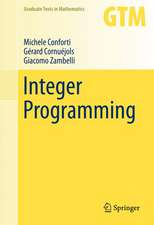Forming Winning Strategies: An Integrated Theory of Habitual Domains
Autor Po L. Yu Ilustrat de J. T. Butler, J. B. Spectoren Limba Engleză Paperback – 15 sep 2011
Preț: 395.25 lei
Nou
Puncte Express: 593
Preț estimativ în valută:
75.64€ • 78.14$ • 62.95£
75.64€ • 78.14$ • 62.95£
Carte tipărită la comandă
Livrare economică 26 martie-09 aprilie
Preluare comenzi: 021 569.72.76
Specificații
ISBN-13: 9783642647802
ISBN-10: 3642647804
Pagini: 420
Ilustrații: XXII, 392 p.
Dimensiuni: 155 x 235 x 22 mm
Greutate: 0.59 kg
Ediția:Softcover reprint of the original 1st ed. 1990
Editura: Springer Berlin, Heidelberg
Colecția Springer
Locul publicării:Berlin, Heidelberg, Germany
ISBN-10: 3642647804
Pagini: 420
Ilustrații: XXII, 392 p.
Dimensiuni: 155 x 235 x 22 mm
Greutate: 0.59 kg
Ediția:Softcover reprint of the original 1st ed. 1990
Editura: Springer Berlin, Heidelberg
Colecția Springer
Locul publicării:Berlin, Heidelberg, Germany
Public țintă
Professional/practitionerCuprins
1. Introduction.- 1.1 Main Objectives.- 1.2 Main Features.- 1.3 Suggestions for the Best Use of this Book.- 2. Behavior Mechanism Part 1: Brain, Memory and Thoughts.- 2.1 Overview.- 2.2 Circuit Pattern Hypothesis (H1).- 2.3 Unlimited Capacity Hypothesis (H2).- 2.4 Efficient Restructuring Hypothesis (H3).- 2.5 Analogy/Association Hypothesis (H4).- 2.6 Further Reading.- 3. Behavior Mechanism Part 2: Charges, Attention, and Actions.- 3.1 Goal Setting and State Evaluation.- 3.2. Charge Structures and Attention Allocation.- 3.3 Discharge Hypothesis (H7).- 3.4 Information Input Hypothesis (H8).- 3.5 Summary and Conclusion.- 3.6 (Appendix) The Ordering of Charge Structures.- 3.7 Further Reading.- 4. Common Behavior Tendencies and Applications.- 4.1 Introduction.- 4.2 Social Comparison Theory.- 4.3 Halo Effect.- 4.4 Self-Projection Effect.- 4.5 Proximity Theory.- 4.6 Reciprocation Behavior.- 4.7 Similarity Effects.- 4.8 Scapegoating Behavior.- 4.9 Responsibility Diffusion in Group Behavior.- 4.10 Further Reading.- 5. Habitual Domains: Formation and Properties.- 5.1 Introduction.- 5.2 Formation of Habitual Domains.- 5.3 Decomposition of Habitual Domains.- 5.4 Paradoxical Properties of Habitual Domains.- 5.5 Degree of Habitual Domain Expansion.- 5.6 Further Reading.- 6. Habitual Domains: Expansion and Interactions.- 6.1 Methods for Expansion of Habitual Domains.- 6.2 Ideas That Catch Our Attention.- 6.3 Ideas that are Hard to Catch Our Attention.- 6.4 Proper Attitudes in the Interaction of Habitual Domains.- 6.5 Expansion and Learning Process.- 6.6 Summary of Habitual Domain Concepts.- 6.7 Further Reading.- 7. Understanding Decision Making.- 7.1 Introduction.- 7.2 Nontrivial Decision Examples.- 7.3 Decision Elements.- 7.4 Decision Environments.- 7.5 Further Reading.- 8. EffectiveDecision Making.- 8.1 Decision Cycles.- 8.2 Cores of Habitual Domains.- 8.3 Learning Processes.- 8.4 Competence Sets and Classes of Decision Problems.- 8.5 Confidence, Risk Taking and Ignorance.- 8.6 Effective Decision Making.- 8.7 Decision Assistance.- 8.8 (Appendix) Decision Situation and Competence Sets.- 8.9 Further Reading.- 9. Effective Goal Setting and Performance.- 9.1 Introduction.- 9.2 Performance Factors.- 9.3 A General Principle of Effective Goal Setting.- 9.4 Control Variables in Goal Setting.- 9.5 Control Variables in Support Systems.- 9.6 Decomposition Principle.- 9.7 Implementation.- 9.8 Some Empirically Known Results.- 9.9 Further Reading.- 10. Knowing Habitual Domains.- 10.1 Introduction.- 10.2 Personal Habitual Domains-An Introduction.- 10.3 Habitual Domains on Behavior Functions.- 10.4 Habitual Domains on Events.- 10.5 Habitual Domains on External Interactions.- 10.6 General Application Procedures.- 10.7 Organization Habitual Domains.- 10.8 Nine Principles for Deep Knowledge.- 10.9 Further Reading.- 11. Understanding Games, Cooperation and Conflicts.- 11.1 Introduction.- 11.2 Cooperation and Conflict in Simplicity.- 11.3 Complex World of Conflicts and Cooperation.- 11.4 Further Reading.- 12. Restructuring Games and Forming Winning Strategies.- 12.1 Restructuring Interplays-Second Order Games.- 12.2 Observations from the Behavior Mechanism.- 12.3 Conflict Maps for Conflict Assessment.- 12.4 Forming Winning Strategies and Applications.- 12.5 Further Reading.- 13. Career Management.- 13.1 Introduction.- 13.2 Career Evolutions and Stages.- 13.3 Taking Charge of Career Stages.- 13.4 A Case Study.- 13.5 Further Reading.- 14. Ideal Habitual Domains.









